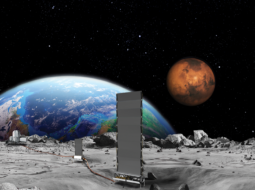2024 will go down in history as the year the first commercial spacecraft successfully landed on the Moon’s surface—and traffic on Earth’s natural satellite is only expected to pick up.
From NASA’s Artemis missions to more commercial lunar landing attempts to other nations’ journeys to the Moon’s surface, it’s clear that the entire world has its sights set on the Moon. But building a sustainable lunar economy—the goal of space agencies and the commercial sector—will require advancements in everything from power generation to mining to agriculture.
Here are five of our top stories from 2024 looking at companies that are trying to solve those problems:
Lunar Infrastructure Startup Ethos Emerges from Stealth: If the Apollo era was all about “flags and footprints,” Artemis’ bid for a permanent presence on the Moon will center around lunar infrastructure—the era of “pads and gas pumps.” Ethos Space Resources, a lunar infrastructure startup with deep ties to SpaceX, emerged from stealth with plans to tackle this very infrastructure challenge. The company is developing technology to melt lunar regolith, producing both a flat surface for landing and take-off and liquid oxygen (LOX) for rocket propellant.
Intuitive Machines Will Build A Lunar Communications Network: NASA awarded Intuitive Machines ($LUNR) a long-term contract potentially worth $4.82B to develop, launch and operate a five-satellite communications and navigation network around the Moon. The network will enable constant connectivity with the Moon’s south pole as traffic picks up there, first for landers and rovers, and then for crewed missions as part of Artemis.
Volta Space Wants To Beam Power To The Moon: The steady march of robots to the Moon will be fueled by electricity, most of it generated by solar power—but what happens during the lunar night that lasts two Earth weeks, or in permanently shadowed craters into which scientists are dying to poke their electronic noses? Volta Space, a Montreal-based startup, has an answer: A lunar satellite constellation that harnesses solar power and uses lasers to beam it down to landers, rovers, and anything else on the Moon that needs electrical power.
Accelerator Announces First European Space Resources Cohort: The companies all boast business models that don’t depend on reaching the lunar surface to generate revenue. And, interestingly, for an accelerator shooting for the Moon, one-third of this first cohort operates largely outside the space industry. It’s a sign that investors are beginning to see value in space companies without “space” in their name.
Interstellar Lab Wants To Send Roses To The Moon: If Interstellar Lab has its way, future astronauts may be able to literally stop and smell the roses while working on the Moon. The biofarming startup recently announced Mission Little Prince, an ambitious plan to deliver a rose in bloom to the barren, gray lunar surface, and beam a picture back to Earth.





